Chasing an avoidant is no fun. Every time you try to get close to an avoidant and think you’ve made some progress, the avoidant steps on the brakes and shows you that you’re not on the same page emotionally and interest-wise.
You’re miles apart in that regard because you’re different people. You’re a person who likes to spend time together and bond whereas the avoidant (presumably your ex or someone you dated or want to date) is unwilling or incapable of connecting with you.
Due to something that happened in the past, he or she prefers to keep you at a comfortable distance and stay in control of what happens to his or her emotions, time, and other things that you want.
The avoidant just can’t give you what you’re asking because he or she is afraid or smothered by your indirect requests and presence. Your behavior (as friendly as it may be) overwhelms the avoidant and triggers his or her need for space and solitude.
And this hurts you immensely. It activates your desire for recognition and bonding and makes you want to be with the avoidant even more. His or her rejection (direct or indirect) starves you for approval as you developed expectations of this person and are deeply invested in him or her.
How could you not be when you’ve given much more than you’ve received?
I call such relationships imbalanced relationships. They’re very difficult relationships as avoidants don’t realize that they’re keeping people away due to some traumatic experience that most likely occurred in childhood and that they have some work to do on themselves.
They have to get to the root cause of their thoughts, feelings, fears, and behaviors and begin working on them (preferably with a therapist).
Most avoidants (and people in general) sadly don’t realize they need help. They tend not to ask themselves why they’re avoiding deep emotional connections and who or what may be responsible for it.
Avoidants who’ve been avoiding people all their life simply don’t see their behavior as the main part of the issue. They think others are being too pushy, intrusive, demanding, or complicated and that they need to back off and respect their boundaries.
Such people often want lots and lots of space to themselves so they can focus on themselves and do what makes them happy.
Typically, avoidants like to:
- spend time with friends rather than romantic partners
- relax at home a lot (many are introverts)
- participate in activities that require minimum interactions with people
If an average person dislikes being pressured and told what to do, an avoidant absolutely despises it. He or she loathes controlling behaviors and highly emotional situations that create a feeling of losing control and being forced into thinking, feeling, and behaving like others.
An avoidant needs people to understand them and act accordingly to their feelings, beliefs, and expectations. Those who aren’t on the same page with them usually find themselves being pushed away.
In relationships, avoidants are in full control and set the pace. At the beginning of the relationship, they appear “normal” because they’re satisfied and like how the relationship feels. But when things start getting serious (normally a couple of months into the relationship), they stop feeling infatuated and reveal their true selves.
That’s when they show what they want to do with their free time and how often they want to see their partner.
Some avoidants outrightly express they feel suffocated whereas others choose a more indirect approach. Instead of directly rejecting their partner, they say they like to see the person they date only x number of times a week and at certain times.
They basically dictate the flow of the relationship early on as expect their partner to act in accordance with their wants and needs. They are the least interested/attached party, so they can take bigger risks.
That obviously doesn’t make their partner happy. Their partner typically has bigger relationship goals and expectations. But because their partner loves them and depends on them, he or she doesn’t have a choice but to comply. This is how their partner embarks on a journey of anxiety, yearning, and tons of unmet expectations.
In today’s post, we discuss what happens when you stop chasing an avoidant who hasn’t paid much attention to you.
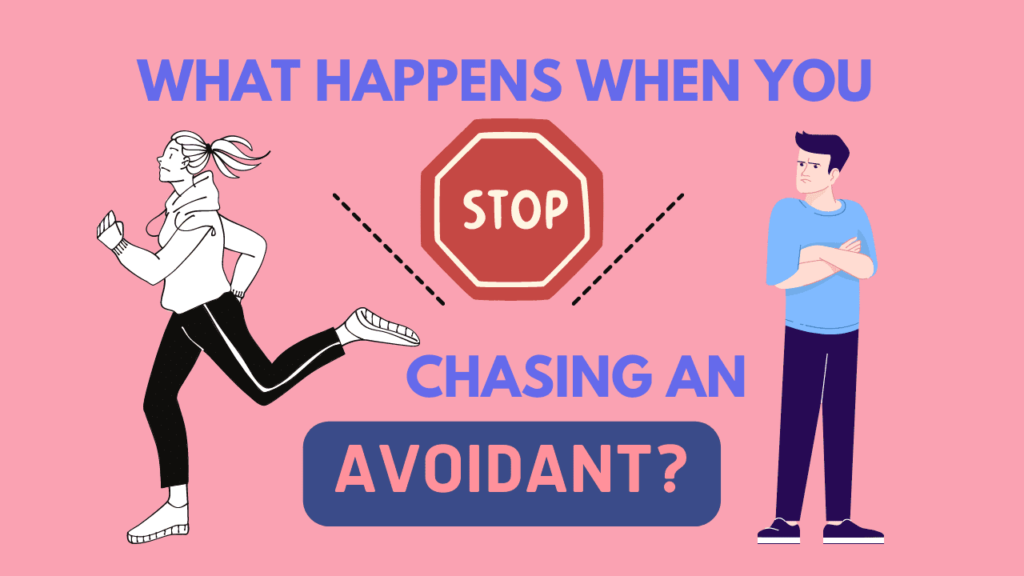

Why do avoidants avoid you?
An avoidant doesn’t avoid you to hurt you and make you chase. He or she does it to focus on plans that don’t involve you. Those plans include hobbies, activities, and people who make the avoidant feel the safest and most comfortable.
It’s not your fault that the person you like ignored you. The avoidant just feels the most pressured and his/her true self when he or she is around you. The man or woman thinks that he or she needs to put his or her needs aside for you and meet your expectations and please you.
This is especially true if you’re in a relationship or were in a relationship because that would make you this person’s partner or ex-partner – someone he or she got used to and can treat the way you allow him or her to treat you.
Sadly, many people will give you the kind of treatment you give yourself. If they see you lack respect for yourself, they’ll take you as seriously as you take yourself and end up hurting you. In other words, they’ll do anything they can to uplift themselves and protect themselves.
Mean people will boost their egos and feel better about themselves whereas avoidants will sacrifice your health and well-being for theirs.
So keep in mind that an avoidant avoids you not because you’re a bad person but because you’re more attached and interested in being with him or her than the avoidant is in you.
As long as the relationship is so imbalanced, the avoidant is going to feel pressured and uncomfortable and avoid you like the plague when he or she feels you need something he or she can’t or doesn’t feel like giving.
Of course, the avoidant could eventually reflect and grow, but that likely won’t happen while he or she is with you. It is much more likely to happen later when someone or something hurts the avoidant and forces him or her to think and self-invest.
If you wait for an avoidant to change while he or she is with you, you’ll most likely be waiting a long time (maybe forever). Changing avoidant tendencies will not only take time but will also require immense commitment.
You have to remember that avoidant behavior is deep-rooted and that a mere desire to be a better partner won’t suffice. The avoidant will have to discover what event or events in life caused emotional scars and made him or her avoid deep connections.
Only then can the avoidant then start doing the opposite of what feelings instruct him or her to do.
So if feelings tell the avoidant to run, the avoidant will have to practice relaxation techniques and communicate the way he or she feels and doesn’t feel. That’s how the avoidant can rewire his/her brain and find deep conversations, bonding, and time more pleasant and valuable.
What happens when you stop chasing an avoidant
If you’re in a relationship with an avoidant, the best thing you can do is stop chasing. Withdrawing your attention and pressure won’t instantly fix things, but it will make your partner feel respected and understood. It will tell him something’s changed and that you don’t depend on him as much as you did before.
This could (but likely won’t) encourage him to be more self-aware and invest in you out of fear of losing you. Pulling back is a simple psychological trick that makes romantic partners afraid of being abandoned and feeling unworthy and undesired.
Usually, stepping away from a partner who doesn’t appreciate you and pay you sufficient attention hurts the partner and makes him or her try harder. But when it comes to avoidants, they tend not to feel very motivated to invest. They normally appreciate the space they get and as a result, continue to focus on themselves.
It’s the same with avoidant dumpers. They also like to be left alone and don’t expect and want to be chased. The end of the chase doesn’t suddenly make them want to hear from you because they’re finally allowed to do what they want and feel like themselves.
Avoidant exes don’t regret breaking up anytime soon because they’re convinced their ex wasn’t compatible with them. They think their ex didn’t understand them and wasn’t on the same page with them—and that the only thing left to do is to distance themselves from their ex.
By doing so, they can focus on themselves and try to find someone who accepts their minimalistic relationship expectations and a lack of investment in the relationship. Little do they know that such people are hard to find as most people want a serious commitment.
They don’t want to be in a relationship that feels more like friendship with benefits.
That’s why the most compatible dating partner for an avoidant is an avoidant. It must just be another avoidant person, though. It must be someone with similar values, goals, perceptions, and expectations.
If your ex was an avoidant, you need to stop chasing your ex immediately. Refusing to do so will only complicate things as it will give your ex unnecessary power and put him or her into a corner.
And what do people backed into a corner do?
They feel they have no choice but to respond in ways that match the pressure their ex is giving them. For many avoidants, this is an extremely angry response that forces dumpees to stay away from them.
So if you’re certain the person you’re dealing with is an avoidant or has avoidant tendencies, know that any kind of chasing (aka pressuring) is going to have the opposite of the desired effect. It’s going to decrease the avoidant’s interest and respect for you and lower the chances of having any kind of relationship with him or her.
The only logical thing to do in such a situation is to stop running after the avoidant and look after yourself.
When you stop chasing an avoidant, you’ll notice that the avoidant is happier and more relaxed. And that will be all the proof you need to know that you’re doing the right thing.
It may not be what you want because you want to see the avoidant care about you and talk to you, but obviously, forcing it isn’t the right approach here. Force hasn’t cultivated any success so far and it most likely never will.
Always remember that an avoidant is void of love and that the only thing he or she has left for you is respect. If you give him or her a reason to take that away too, you’ll not only have a difficult time attracting the avoidant but also find it hard to love yourself.
You’ll want the avoidant to love you so badly that you’ll fail to value yourself.
It’s fair to say that at the moment, your situation is completely one-sided. You’re doing all the work while the person in question is taking it easy. For the relationship to work, things much flip upside down. The avoidant must fear losing you and you must be okay with the relationship ending.
When that happens, the avoidant will give you your power back, chase you, and put you in a position of strength where you can decide what the best thing to do is.
So while you’re waiting for power to switch, do your best to preserve your worth. Go no contact with the avoidant and let him or her see that you’re not going to chase a person who avoids you and doesn’t appreciate you.
Here’s what normally happens when you stop chasing an avoidant and focus on yourself.
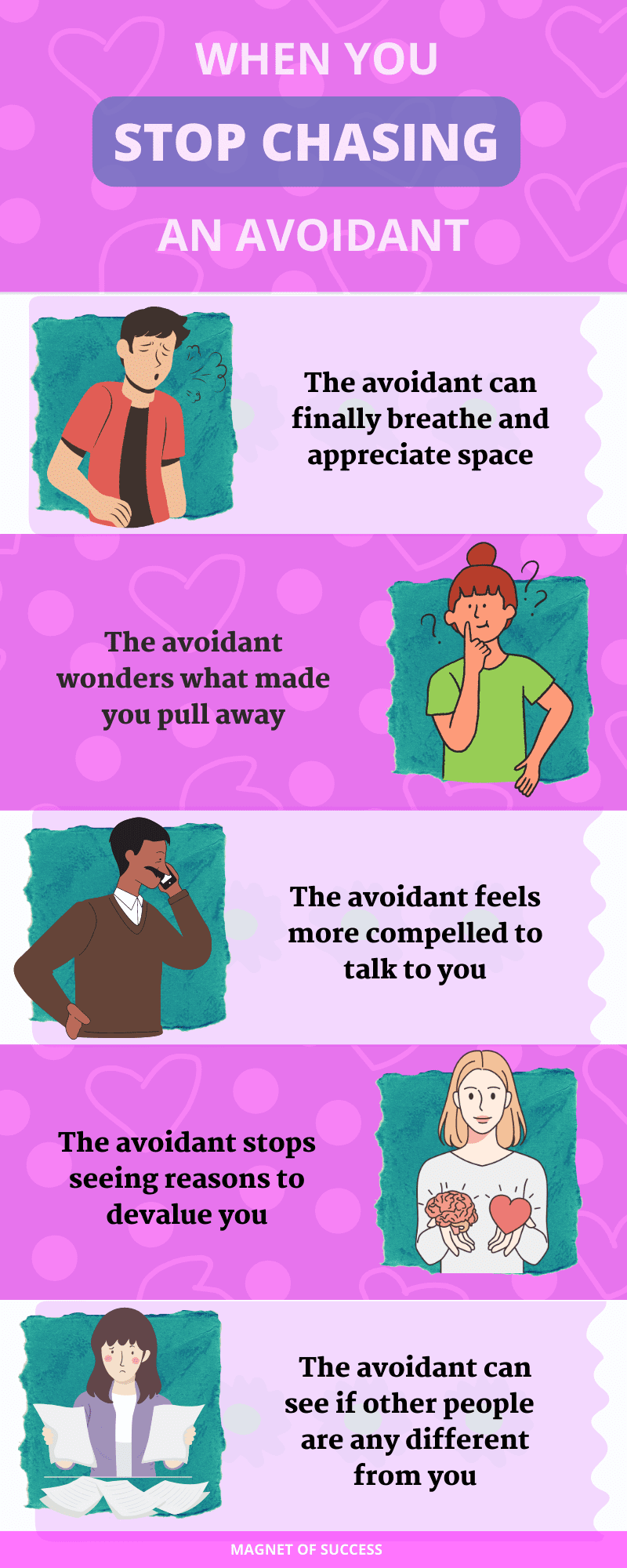

Walking away from an avoidant is a must. Do it to keep your sanity and preserve your self-worth. The person you’re walking away from needs to feel that you value yourself and that he or she isn’t worth chasing.
So distance yourself from an avoidant when you’re not a priority. It will send the message that your self-esteem and self-control are high enough to be happy on your own.
What happens to you when you stop chasing an avoidant?
When you stop chasing an avoidant, you’ll slowly start processing your attachment to the avoidant and feeling better. You won’t recover overnight because healing takes time, but a week or two after withdrawing your attention, you will feel that you’ve regained some control over your mind and body and that it was the right thing to do.
Pulling away from someone who doesn’t give you the recognition you deserve will free you. It will let you see and feel that he or she was the worst person you could have gotten close to and that the most sensible thing to do is to stay far away from him or her.
The farther you are physically and the bigger the emotional distance, the less you’ll miss the avoidant and the fewer emotional setbacks you’ll encounter. The breakup/relationship recovery plan is the same whether your dating partner/ex is a fearful-avoidant, dismissive-avoidant, or just an average joe who rejected you.
You need to stop chasing an avoidant to recognize your worth and live a happy life. Make sure to also stay away from advice that says avoidants can be reasoned with. They may be rational people, but they won’t change the way they perceive you and the things they expect out of romantic relationships.
The sooner you accept you don’t have the power to change an avoidant the better.
What if an avoidant still loves you?
If an avoidant loves you, rest assured that you’ll be the first to learn about it. You’ll see that he or she has feelings for you soon or right after pulling away.
I can say this confidently because your lack of interest and presence will tell the avoidant that you’re fed up with avoidant behavior and that you want an all-or-nothing kind of relationship. You want a relationship in which you feel respected, wanted, and prioritized.
If you can’t have that, you don’t want to be a part of his or her life at all.
So if an avoidant you’re going no contact with still loves you, the man or woman will quickly let you know that. Avoidant or not, losing a romantic partner is painful and scary and makes even the most prideful people realize they lost a valuable person who treated them with care and respect.
You need to be patient and have faith that someone who loves you will show you love by refusing to spend more than a few days apart from you.
What do you think happens when you stop chasing an avoidant? Are you tempted to stop chasing once and for all? Let us know what your experience with an avoidant is/was like in the comments below.
However, if you prefer to talk to someone about it, know that Magnet of Success specializes in relationships and breakups and that we may be able to assist you. Check out our services here.

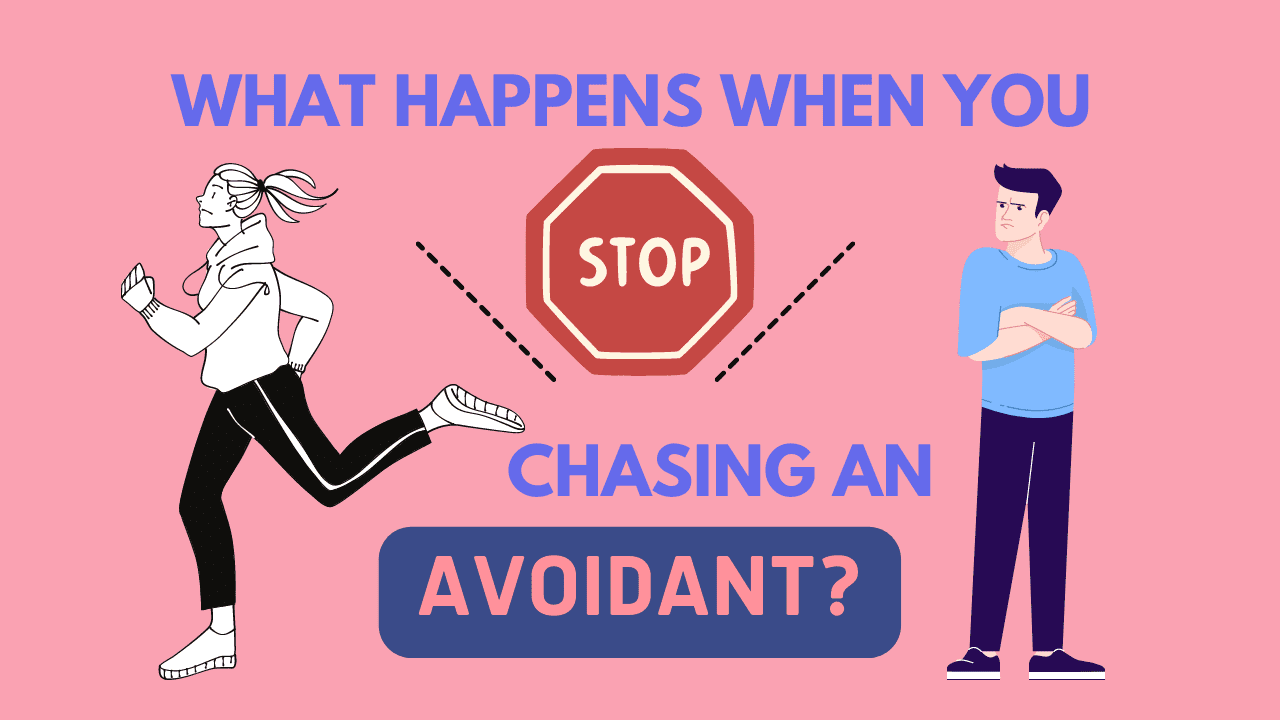
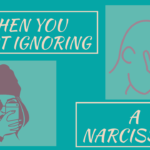

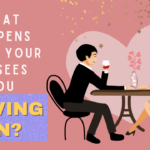
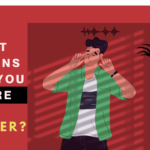
Met a woman last month. She came one strong and was vulnerable. Three weeks in and boom she stared a fight and said she needed space. Haven’t heard from her in 15 days. She was real flaky to. She would make plans and cancel. She also tried to control when and how much time we could see each other. I’m pretty bummed. Today I decided to block all forms of communication she left open.. I refuse to left her back in my life if she did try to reach out again. I’m think she is a fearful avoidant. Thanks for the article!!
Hi Asron.
New relationships aren’t supposed to be that complicated. When they are, it’s a major red flag and a sign that they need to end. I know you’ll be happier on your own than with someone so flaky and unavailable.
Best regards,
Zan
Hi! I love your article. I dated a guy for five months, I got to know his whole family before i met him. He has been dating a classsic narcicist before me, ended it after 4 years. Him and i initited dating meanwhile she was in his apartment. He ensured they were over, so did his family. She eventually moved out 1 months after. The first couple of months were more than great. he pushed it forward, becomming partners and wanted to meet my family. He still shared a dog with his ex, and he felt obligated to continue this because the dog would become sick everytime it had stayed at her home. And he misses the dog. He eventually broke up out of nowhere after 5 months. I did 2 months NC, and initiated contact. He was trilled, we met up and i could sende his feelings. I approached him as just being Friends, and he appreacited that. We would meet up on his initiative every second week, but i would always be the one to reach out. As time passes he started taking me down telling me how he was saying to his brother we were “someone he dated for some months”, meanwhile telling me how ho would start habits and self work that I encouraged. I stopped reaching out after we scheduled a call and he didn’t get back to me. He wants to meet and cook and play games with his family later this week but since he hasn’t replied I don’t expect it happen. His brother laughed it off my telling me he would still be intimate with his ex girlfriend. I’m just like, wtf.
Hi Mel.
I had a feeling he wasn’t entirely done with his ex. Toxic relationships take a long time to process. He was using you as someone to distract himself and have a good time with. But when he got comfortable with you, he could no longer run away from reality and had to face his unresolved problems. That was when he concluded he wasn’t feeling strong emotions and getting the kinds of ups and downs he was getting with his ex.
You can find a better person, Mel. Someone who is ready to start a new relationship and stay with you after the infatuation stage is over.
Best,
Zan
Would have loved to know about DAs before. Had a 5 month relationship. First 3 months were amazing, highly compatible, he was very affectionate and moving things forward. 3 months in, things flipped. He pulled back lots, wasn’t prioritising seeing me, couldn’t communicate feelings and affection slowed down too. At 5 months I initiated break up, we met up a month later and he was so cold and hurtful and I realised I hurt his ego and he needed to lash out and hurt me. A further 3 months have passed with no contact and. I have not heard once from him. It hurts as the potential was so great, but I had to place the value on myself. I still wonder if I’ll ever hear from him but have no expectations.
Hi Jenny.
Things got odd months into the breakup when he got used to you and stopped being obsessed with you. This means the infatuation phase ended, forcing the relationship to transition into a more serious stage. Because he wasn’t ready for it, he quickly lost interest and showed you who he really is. He showed you he’s not the guy he was at the start of the relationship but rather the guy who relies on emotions for guidance in relationship.
In other words, he became emotion-driven (impulsive) and lost the drive to maintain the relationship.
Sincerely,
Zan
Okay I thought it was because he was starting to feel things and was scared off by it given a past hurt. However your take on it seems he was infatuated at the start but just lost interest.
Either way glad I listened to my gut and ended it before wasting too much time.
Hi Jenny.
If he had trauma from the past, he wouldn’t have been so into you. He would have had difficulty expressing emotions and being so affectionate.
I wish you a fast recovery!
Zan
I just came across this. I have just had an on again off again relationship with an avoidant for a bit over a year. But what is great is that I can see now it was her and not me. She felt suffocated by my need to want to move forward in the relationship, she couldnt comminicate, said she needed time and could not have a serious relationship and was back with her ex 3 days later, posting stuff online about how he is the man of her dreams. Hold on, you broke up with him to get back with me, because he meant so much to you back then. Its just a pattern avoidants have, idolising a partner then picking flaws in them. All of that is great it just reconfirmed her issues and has allowed me to realise that I deserve so much more than an avoidnant partner. I feel I have come out of this with so much knowledge and ready for the next chapter of my life.
Hi Michael.
You definitely deserve more. No one should have to go through what you did. Indecisiveness and suffocation in her indicated she wasn’t ready for a serious relationship with you. She acted purely on emotion, hence why she was so excited when she went back to him. Soon, she’ll realize she hasn’t resolved any problems.
Kind regards,
Zan
Hi Zan,
You outlined my recent relationship in a great way. Like many people in the comments I read, I was in a few month relationship with an avoidant, he was great at first, we went through a 5 month long distance period, and he seemed stable, true and willing to make it work. After the long distance period was over, he started causing problems, blaming his work and money instability, he broke up with me but took it back on the same day. We spend a couple of months being ok, but then out of the blue he broke up with me, saying he needed to spend all his free time doing stuff for him, and that the relationship didn’t allow him to do so (even though he never discussed any of these matters before). Till the last minute he looked enthusiastic and thrilled to spend time together. 3 weeks now, I’m following no contact, but I’m hurt because I thought what we had was real.
Hi Victoria.
He didn’t seem emotionally invested in the relationship. He was at first because the relationship was self-propelling, but when it needed work, he realized it was more difficult than he’d thought. He changed his mind the first time most likely because he felt guilty about hurting you. He thought you deserved better (which you did).
Right now, you don’t have a choice but to stay in NC and let him experience the freedom he seeks.
Sincerely,
Zan
Wow you just outlined my life with every word. I wish attachment styles was taught in high school. This is a life lesson people only learn in retrospect and it’s hard toll to bear. It has made me a stronger person because I’m finally on the other side of it but damn did I waste a lot of time feeling shitty. I’m so glad I found myself and have the literature backup that explains it. Thank you, Thank you. Onward and upward!
Hi Michelle.
Thanks for reading and commenting. I’m pleased to hear that you found the article helpful.
Stay strong, Michelle!
Zan
Re: my comment above – correction
*your realization
Lisa,
Because you have been moved to tears from recognizing your avoidant behavior as well as your ex’s, then you’re realization that therapy can give you some tools for future growth means you’re stronger than you think. Talk to Zan, if you’re ready. He helped me cope during some dark days, and I learned so much from his advice.
I’m in the U.S., and his fees compared to LMHC here are more than reasonable.
Good luck!
Hi Zan, I am in tears. I am an avoidant and I just lost the best boyfriend I ever had. I did everything you talked about and so did he. Him leaving me opened my eyes and I’m devastated. I don’t know what to do except go for therapy to figure out how I got to be this way. I’m so upset and afraid to talk to him for fear of pushing him away further.
In tears
Lisa
Hi Lisa.
If he broke up with you because of your avoidant tendencies, you have to leave him alone and work on yourself. Find out what made you into an avoidant person and how you can fix it. The guy will probably stay away from you for a while and try to heal in his own ways.
Best regards,
Zan
I was with a fearful avoidant (I’m guessing) for 8 wonderful years (engaged for 3) before he dumped me 6 months ago ‘to figure his stuff out’. I did a few needy things but gave him space and moved out for him. A week later his female colleague moved in. I’ve seen his diary, ‘he loves her and wants this to work’. She is completely different to all his values.
I’m guessing I have no hope in hell and have to watch them be the happy couple?
Hi Katie.
He probably cheated on you and left you for her. Guys usually make sure that the person they commit to is the right person for them before they dump their partner. They do that by getting to know the new woman, bonding with her, flirting, and sometimes even sleeping with her.
The best advice I can give you, Katie is to stop keeping an eye on them. Distance yourself from them instead and focus on detaching, healing, and growing as a person.
Kind regards,
Zan
Zan,
You do your best work after you’ve taken a break to regroup. Thanks for this article. Thanks for putting a name on avoidant behavior, which leaves nothing but wreckage behind. Someone in your comments a while back said that not caring creeps up on you. I think that comment will comfort some readers.
Merry Christmas to everyone following Magnet of Success!
Hi Claire.
Merry belated Christmas.
Avoidants pay for their avoidant tendencies on a daily basis. I know it seems like they get away with everything, but they live unfulfilling lives, full of chaos. Their best match is another avoidant with similar behaviors.
Kind regards,
Zan
another good advice from you!
I saved it to read whenever I forget things haha
Thank you Zan!
Merry Christmas 🎄
Thanks for reading, Linda.
Merry belated Christmas to you and your loved ones.
Zan
Great advice. I was dating someone for a couple of months, he was amazing in the beginning, planned all dates and said the right things, and of course he pulled away. I didn’t chase, he returned apologising and confessing his fear due to past heartbreak but then unfortunately disappeared again. He has potential if he healed, but I know I’m worth a man who makes me feel wanted!
Hi Mia.
He couldn’t stay because he hadn’t addressed his issues. Had he taken the time to reflect and heal, he might have invested in you.
You deserve someone who’s ready to be with you. I’m sure you’ll find him!
Best regards,
Zan